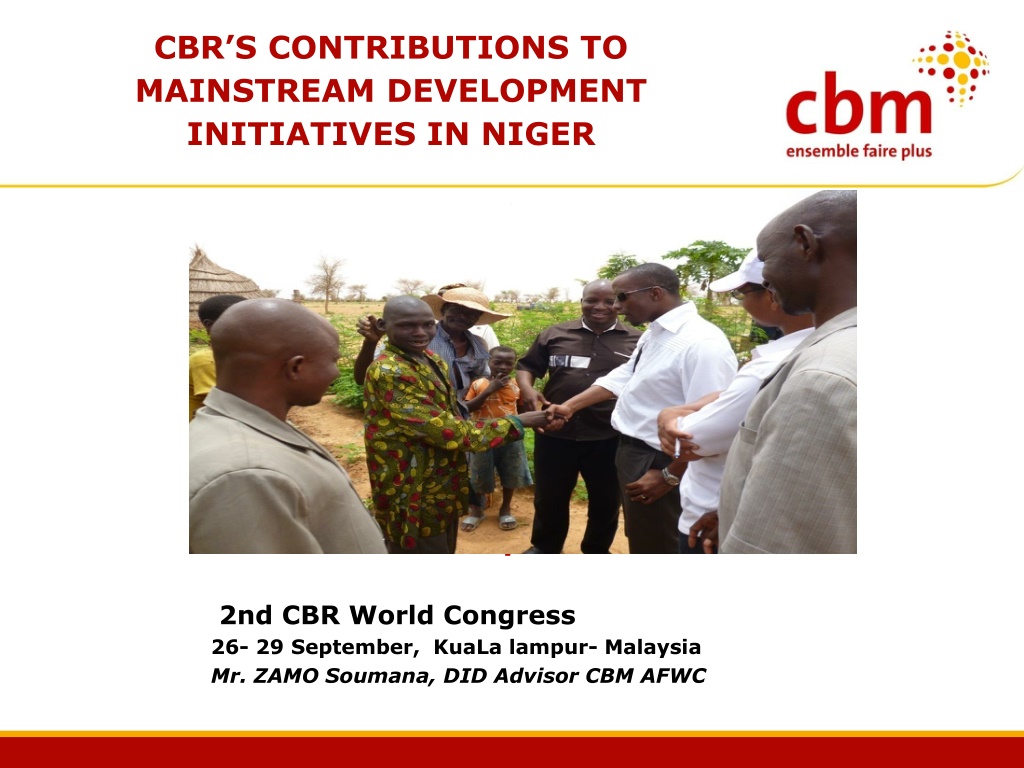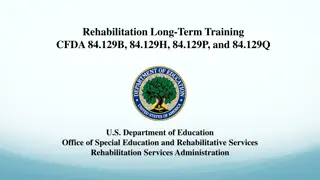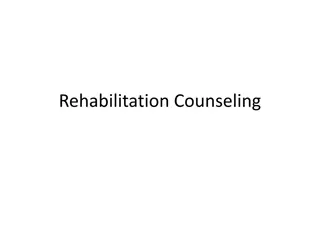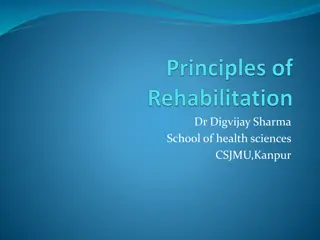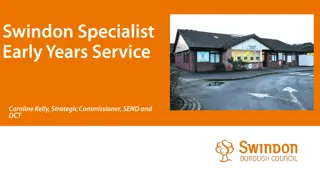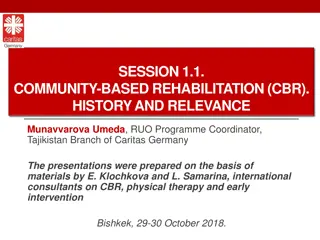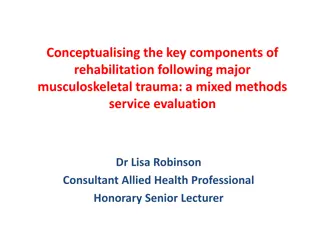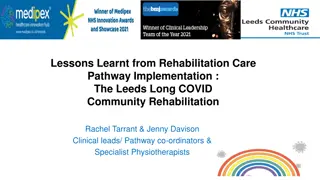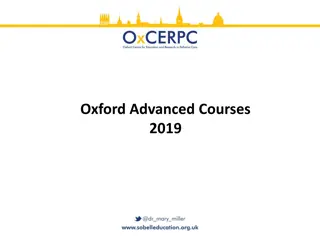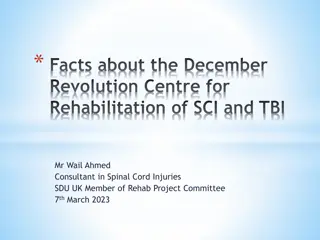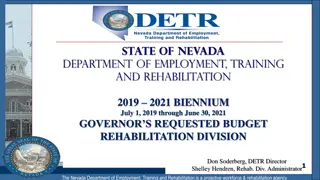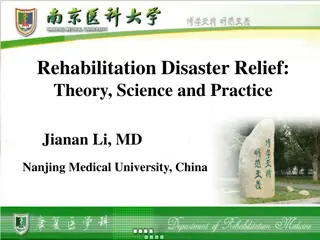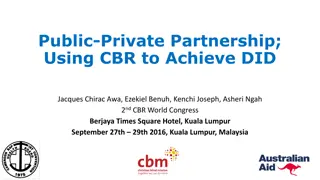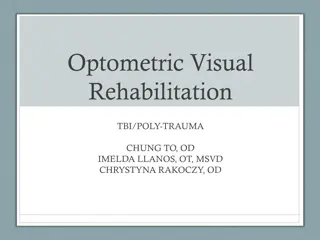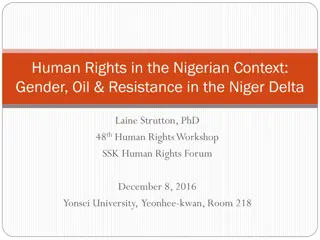Contributions of Community-Based Rehabilitation Strategies to Mainstream Development Initiatives in Niger
The Community-Based Rehabilitation (CBR) strategy in Niger aims to eliminate barriers and facilitate the inclusion of persons with disabilities in community life. Through initiatives like the ProDIB program, efforts focus on identifying needs, raising awareness, providing services, and advocating for disability mainstreaming. The twin-track approach is employed to empower individuals with disabilities and influence policies for inclusive development.
- Community-Based Rehabilitation
- Mainstream Development
- Disability Inclusion
- Niger
- Twin-Track Approach
Download Presentation

Please find below an Image/Link to download the presentation.
The content on the website is provided AS IS for your information and personal use only. It may not be sold, licensed, or shared on other websites without obtaining consent from the author. Download presentation by click this link. If you encounter any issues during the download, it is possible that the publisher has removed the file from their server.
E N D
Presentation Transcript
CBRS CONTRIBUTIONS TO MAINSTREAM DEVELOPMENT INITIATIVES IN NIGER . 2nd CBR World Congress 26- 29 September, KuaLa lampur- Malaysia Mr. ZAMO Soumana, DID Advisor CBM AFWC
Outline 1. Introduction 1. Methods 2. Approach 3. Results 4. Lessons learned 5. Conclusion
Introduction The CBR strategy contribute largely to reinforce the capacity and aptitude of the PWDs. CBR interventions provide also concrete evidence which demonstrate why and how disability mainstreaming can be achieved.. In addition to empowering PWDs, CBR interventions contribute to inform and convince decision makers to commit and mainstream their policies, strategies and programmes to facilitate inclusive development. This is why twin track approach is very essential to really respond to the multi faced needs of persons with disabilities in short, mid and longer terms.
Introduction CBM strategic plan global objective in Niger is to Contribute to the elimination of physical, communicative, and institutional barriers as well as those related to attitudes in order to facilitate inclusion of Persons with disabilities in the community life. In that respect, CBM has initiated between other a five-year inclusive community-based program (ProDIB 2012-2015) through which five (5) partners are working together to implement six (6) key projects covering the health, education livelihood and social interventions. In addition of provision of services there were strong component on advocacy for the inclusion of the needs of persons with disabilities in policies, programs and projects through a multi-disciplinary and multi-sector approach.
Methods The inclusive community-based program (ProDIB 2012-2015) work and focus on : Identification of the persons with disabilities Identification and analysis of the needs of persons with disabilities Awareness-raising activities both at individual and collective approach to increase knowledge and a referral system Efforts in service provision to create sustainable access to services Develop service providers capacity in medical and community rehabilitation services to be open for the PWDs Advocacy for disability mainstreaming in all the existing services Research and publication of best practices
Approach The project is adopting the twin-track approach with activities to prepare individuals PWDs through specific services and those aiming to mainstream policies, programmes and services in order to facilitate effective & sustainable inclusive development. Therefore the project reinforce the access to critical specific services for the PWDs and advocate for elaboration and implementation of inclusive strategies, policies and programmes. The second track focus on the inclusion and mainstreaming disabilities in the existing existing services (easy access, affordability)
Results All partners carried out advocacy as a cross-cutting activity in collaboration with associate partners, namely the Niger Federation of Persons with Disabilities, the Ministry of Population, Promotion of the Woman and Protection of the Child, and Plan Niger to influence public policies and strategies, as well as public technical services and NGOs at both national and local level. The inclusive community Development Programme (ProDIB phase I) support has enhanced the technical and organizational capacities of the Niger Federation of Persons with Disabilities (FNPH) (including its member organizations) which has become a key player in all decisions related to persons with disabilities within the country.
Results The FNPH and their local branches (Dosso and Filingue regions) that capacities has been built through ProDID interventions are now very active in the field of advocacy and started to claim for more rights, more inclusion. They are now working to influence government and development organizations both at the national and local levels. The main outcomes promotion the mainstreaming of disability are : increasing the credibility of the FNPH and its recognition by the Government as body that responds on behalf of all persons with disabilities the increasing of the number of PWDs counted during the 2012 census the increasing of number of PWDS who stand for political elections
Results Therefore two mains disability mainstreaming activities were carried out: one the inclusive census and one the political participation of PWDs. The results of these activities were highly satisfactory outcome. For the general census from 0.80 % of PWDS in 2001 we have 4,2 % of persons with disabilities For the political participation of PWDs from 0 candidate under the banner of political parties in 2011 to 7 candidates under the banner of political parties in 2016. Through the application of the CBR strategy and twin track approach CBM Niger is implemented a multi-sector and multi-actor Programme for Inclusive Community Development in Niger. The program focused on the different elements of the matrix. As one can the project contributed the social status of persons with disabilities and facilitate their social integration
Lessons learned How twin track approach facilitate the Disability mainstreaming in both rural and urban contexte CBR is useful strategy for disability mainstreaming in development process
Conclusion CBR remains as key strategy if we want to achieve the mainstreaming policies as it helps: Empowering individuals and or a group trough the provision of both key social services and specialized at grassroots level where live the poorest of the poor To be a concrete platform for best practices that inform policy makers and help convince decision makers to elaborate new inclusive policies and laws To develop a multi sectorial approaches which facilitate implementation of synergy and networking of various actors leading promotion disability mainstreaming To put in practice legal instruments adopted by governments in general and the UNCRPD in particular
